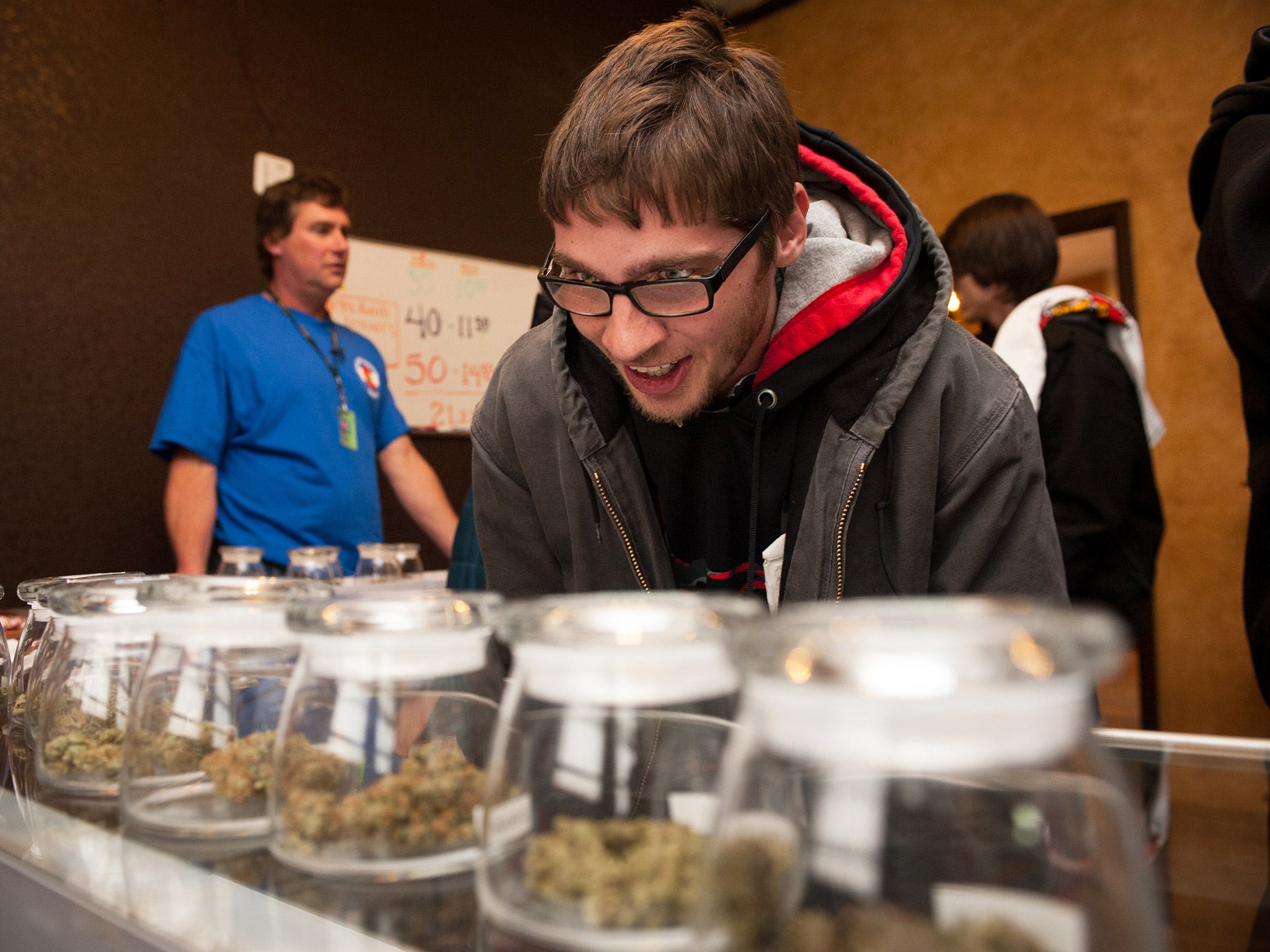Drug abuse: But is Britain ready to grow up?
First Commons debate for a generation offers rare chance for honest discussion

A punitive approach to drug abuse including locking up addicts fails to curb levels of addiction, a Home Office study warns today, as MPs stage the first Commons debate on drugs legislation in a generation.
The report suggests treating possession of drugs as a health – rather than criminal – matter reduces drug deaths and HIV infection rates without increasing addiction levels.
Its findings, which have been kept under wraps for three months amid a Coalition row, will be used as ammunition by supporters of a complete overhaul of the country’s 43-year-old drugs laws.
The MP leading calls for a fresh approach told The Independent yesterday that the “tide is beginning to turn” among politicians and the public on how to combat drug addiction.
The report said: “It is not clear decriminalisation has an impact on levels of drug use. Following decriminalisation in Portugal there has not been a lasting increase in adult drug use. Looking across different countries, there is no apparent correlation between the ‘toughness’ of a country’s approach and the prevalence of adult drug use.”
It also said the Government would monitor results in Uruguay and some US states which have recently legalised possession of cannabis.
The review of other countries’ experience of drugs legislation was set up 18 months ago by the Home Secretary, Theresa May, and conducted by two Liberal Democrat ministers, Jeremy Browne and then Norman Baker.
It was completed in July but publication delayed, provoking accusations from Mr Baker that senior Conservatives were attempting to bury its findings because they were politically inconvenient.
Last night, Mr Baker said that policy should be “based on evidence, not dogma or the desire to sound tough. If you are anti-drugs you should be pro-reform”. He said: “For too long, successive governments have been unwilling to look at the evidence. This comprehensive report shows that other ways of tackling drug addiction and supply can save lives and cut crime.”
But Coalition tensions were underlined as a Home Office spokesman said: “This government has absolutely no intention of decriminalising drugs. Our drugs strategy is working and there is a long-term downward trend in drug misuse in the UK.
“It is right we look at drugs policies in other countries and today’s report summarises a number of these international approaches.”
Its release comes ahead of today’s Commons debate in which a cross-party group of MPs will call for a fresh look at legislation. They will be backed by Mr Baker, but opposed by Conservative MPs.
It was secured by the Green MP Caroline Lucas with the backing of a former Labour drugs minister, Bob Ainsworth, and Julian Huppert, a Liberal Democrat member of the Home Affairs Select Committee.

Four years ago, Mr Ainsworth urged the legalisation of all banned substances, including heroin and cocaine, arguing it was better for users to receive drugs on prescription rather than rely on criminals.
It comes after more than 130,000 people signed a petition calling for a review of the 1971 Misuse of Drugs Act.
Ms Lucas said: “Part of my motivation for doing this comes from representing a place like Brighton. For many years we had the unwanted title of the drugs capital of Britain. We have now thankfully lost that title, but the more I got to understand the problem, the more I realised things were not working.”
She said current legislation prohibited the establishment of “drugs consumption rooms” staffed by health workers.
“It means you don’t have people shooting up toilets, parks and public stairwells and it’s much safer. Crucially, it means you can reach out to people who are perhaps not in treatment,” she said.
“If you’ve got professionals saying there is evidence that things like drug consumption rooms it should have been something that we could have looked at further. But because of the prohibition context we simply couldn’t.”
She said today’s Commons motion – calling for a drugs policy based on evidence – was widely phrased to attract as much support as possible.
“We believe that when you start looking at the evidence of what works then that may well lead you to believe the prohibition isn’t working. For other people then simply to say ‘we are not even going to look at it’ seems very short-sighted.
“What happened abroad in countries like the US and Portugal helps us. There is a body of evidence out there.”
Ms Lucas said she sensed the “tide is beginning to turn” on the issue. “Even The Sun had an editorial saying we should look again at this,” she said. “My sense, from so many MPs, is that they completely agree with this but they are terribly afraid of being punished at the ballot box.
“I think people are moving to the point now where MPs are misjudging the public and actually there is a far greater interest in having this debate.”
The countries visited by ministers in search of “imaginative” solutions also included Canada, Japan, Denmark and Sweden and America
In a separate and also delayed report, the Home Office said it was to look at a UK-wide ban on so-called ‘legal’ highs in a bid to tackle their sale in high-street “head shops” and on UK-based websites. A blanket ban, similar to that introduced in Ireland in 2010, would give police and courts greater powers to deal with ‘legal’ highs in general, instead of on a substance by substance basis.
The law, the substances and the penalties
Q: When were Britain’s drug laws brought in?
A: The Misuse of Drugs Act of 1971 divided “controlled drugs” into three levels of seriousness. Some details have been revised since then.
Q: Which drugs are class A, and what penalties apply?
A: Heroin, crack, cocaine, ecstasy, LSD, methadone, methamphetamine (crystal meth) and magic mushrooms are considered the most dangerous. People caught in possession face up to seven years in prison, an unlimited fine, or both. Dealing carries a maximum sentence of life imprisonment.
Q: What about class B?
A: Substances in this category include amphetamine, barbiturates, codeine, ketamine and cannabis. Possession carries a maximum penalty of seven years’ jail and/or an unlimited fine; the supply and production of these type of substances carries up to 14 years in prison.

Q: Isn’t that a bit harsh?
A: In practice most people prosecuted over class B drugs receive small fines; not many of them are jailed. Cannabis possession for personal use often receives a caution from the police.
Q: Has cannabis always been in class B?
A: It was downgraded to class C between 2004 and 2009 by the Blair government following warnings the classification lacked credibility. It was moved back to class B by the Brown government.
Q: What is in category C now?
A: This includes the rave drug GHB, diazepam, tranquillisers and anabolic steroids. Khat was added in June. Possession of these drugs carries up to 2 years in prison and/or an unlimited fine (apart from anabolic steroids as it is not an offence to possess them), although in practice small fines and cautions are issued. Suppliers can be jailed for up to 14 years.
Q: Is there a case for looking again at the laws?
A: Yes. The range and type of drugs available has changed dramatically in the 43 years since our laws were formed. Climbing levels of drug use since 1971 suggest the legislation hasn’t been fully effective (despite signs in recent years that use is falling). Critics say the three-category ranking does not reflect the danger or addictiveness of different substances.
Nigel Morris
Join our commenting forum
Join thought-provoking conversations, follow other Independent readers and see their replies
Comments
Bookmark popover
Removed from bookmarks